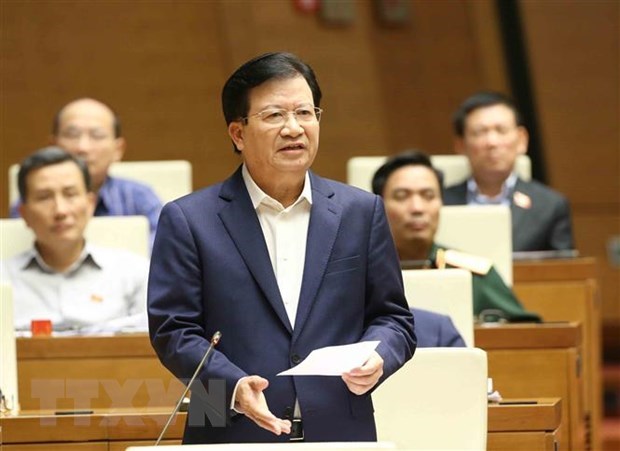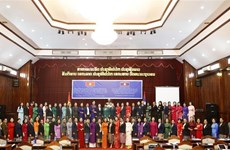Deputy PM, Minister clear up electricity-related questions
Deputy Prime Minister Trinh Dung Dung stressed solutions to adjust the electricity planning scheme and deal with obstacles hindering investment mobilisation in the electricity sector at the National Assembly’s working session on November 7.
 Deputy Prime Minister Trinh Dung Dung (Source: VNA)
Deputy Prime Minister Trinh Dung Dung (Source: VNA) Hanoi (VNA) – Deputy Prime Minister Trinh Dung Dung stressed solutions to adjust the electricity planning scheme and deal with obstacles hindering investment mobilisation in the electricity sector at the National Assembly’s working session on November 7.
During the question-and-answer session to Minister of Industry and Trade Tran Tuan Anh, the Deputy PM Dung said the Prime Minister had decided to adjust the Power Development Plan VII in order to supplement sources of electricity, especially renewable power, given the risk of electricity shortage as from 2019.
The Deputy PM noted that solar and wind power projects not only suit small-and medium-sized enterprises but also easily attract investments both at home and abroad.
By 2030, Vietnam needs up to about 130 billion USD for power development, which is hard to be mobilised, thus causing the sluggishness of many power projects, Dung said.
The official pointed out imbalanced power investment in regions, and emphasised the need to continue constructing the North-South transmission line – circuit 3.
He suggested increasing renewable power in the Power Development Plan VII and allocating electricity in accordance with demands of localities in a bid to repeat the present imbalance.
At the session, Dung updated deputies on the progress of some power projects like Thai Binh 2 Thermal Power Plant, and called for efforts to speed up the implementation of the projects whose investment procedures have been completed, as well as gas-fired electricity projects.
The Deputy PM underlined the need to improve institutions and laws regarding power development, especially typical mechanisms and policies to support, encourage and remove difficulties facing major projects.
During the Q&A session on November 6, Minister of Industry and Trade Tran Tuan Anh said solar, renewable and wind power would help Vietnam deal with the potential shortage of electricity in 2019 and 2020.
As of June 30, 2019 when the electricity price mechanism under the Prime Minister’s Decision 11/2017/QD-TTg expired, nearly 4,900 MW of solar power had been put into service, significantly contributing to the national power source, according to the official./.











